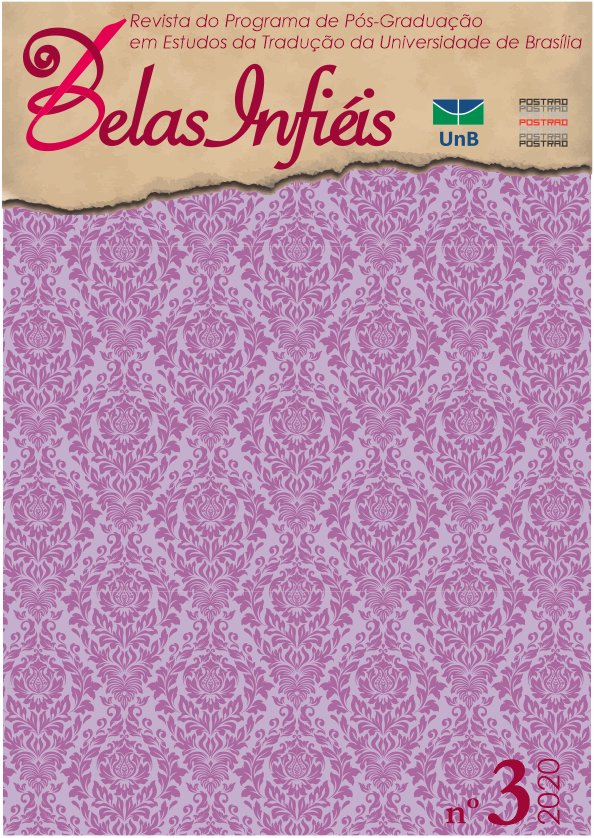A translator at the service of history: Constantin Erbiceanu
DOI:
https://doi.org/10.26512/belasinfieis.v9.n3.2020.30837Keywords:
Epaminonda I. Stamatiades. Constantin Erbiceanu. Dragoman. Interpreting history. Phanariotes.Abstract
This paper presents a text still little known to Romanian researchers in translation studies and even less known to the international academia. Yet, it can be considered doubly important for the history of interpreting. Constantin Erbiceanu’s Romanian version (1897) of the Biographies of the great Greek dragomans (interpreters) of the Ottoman Empire by Epaminonda I. Stamatiades (1865) offers, on the one hand, an unprecedented perspective on the Phanariotes who took turns for almost a century as princes of the Danubian Principalities and, on the other hand, well-documented profiles, touching upon all essential aspects of the profession. With this overview of the Romanian version of the text, we want to emphasize the importance of an informed translator free to choose his texts, and to show how a translation can help a people know itself better and can consolidate a language that is still defining its identity (e.g., Romanian in the late 19th century). We also hope to convince that translating this work into a widely spoken language would benefit researchers in the history of interpreting. We tackle the subject from several perspectives. After a brief survey of the role and destiny of the original, we look at the Romanian translation by answering three main questions: Who is the translator? Why did he consider the translation necessary? How did he translate? This latter question is answered from the points of view of the translator’s paratext, of content as a useful source for the history of interpreting and of language (Romanian scientific terminology was still in its infancy at the time). In this last respect, we look at a series of borrowings from French in order to see what their fate has been in contemporary Romanian.
References
Baconsky, Rodica, et Alina Pelea. « Quand ‘dire c’est faire’ au royaume de l’interprétation. Une page d’histoire ». Discours en présence, édité par Anamaria Curea, Cristiana Papahagi, Monica, Sanda Moraru, et Veronica Manole, Presa Universitară Clujeană, 2015, p. 387-402.
Berindei, Dan. « Constantin Erbiceanu ”“ un mare cărturar român » [Constantin Erbiceanu ”“ un grand savant roumain]. Academica, no. 279-280, 2014, p. 31.
Brad Chisacof, Lia. « Constantin Erbiceanu È™i predecesorul său, Naum Râmniceanu » [Constantin Erbiceanu et son prédécesseur, un Naum Râmniceanu]. Academica, no. 279-280, 2014, p. 34-37.
Cantemir, Dimitrie. Istori’a imperiului ottomanu. Crescerea si scaderea lui cu note fórte instructive de Demetriu Cantemiru principe de Moldavia [Histoire de l’Empire ottoman. Son ascension et son regrès avec des notes très instructives par Dimitrie Cantemir, prince de Moldavie]. Traduction par Dr. Ios. Hodosiu. Bucuresci, Editiunea Societatei Academice romane, 1876.
Erbiceanu, Constantin, traducteur. Biografiile marilor dragomani (interpreÈ›i) greci din Imperiul Otoman [Biographies des grands dragomans (interprètes) grecs de l’Empire Ottoman]. De Stamatiades, Epaminonda I. Préface par Ioan-Aurel Pop. Édition par Rodica Baconsky È™i Alina Pelea, Cluj-Napoca, Casa CărÈ›ii de Åžtiință, 2016.
Erbiceanu, Constantin. Ulfila. ViaÈ›a È™i doctrina lui [Ulfila. Sa vie et sa doctrine]. Préface par Constantin LaurenÅ£iu Erbiceanu. Étude introductive Leonidas Rados. Édition, notes et postface par Mihai Ovidiu CÄ‚Å¢OI, BucureÈ™ti, Editura Enciclocpedică, 2013, 11-21.
Erbiceanu, Costantin. Cronicarii greci care au scris despre români în epoca fanariotă [Chroniqueurs grecs qui ont écrit sur les Roumains pendant l’époque phanariote]. Postface par Andrei Pippidi, préface par Constantin LaurenÅ£iu Erbiceanu, BucureÈ™ti, Editura Cronicar, 2013 [1888].
Iorga, Nicolae. Scrieri alese. Cuvântări È™i comunicări rostite la Academia Română [Écrits choisis. Discours et communications prononcés à l’Académie roumaine]. Partie I. BucureÈ™ti, Editura Academiei Române, 2008.
Rados, Leonidas. « Un student teolog la începuturile Universității din IaÈ™i: Constantin Erbiceanu (1860-1864) » [Un étudiant en théologie aux début de l’Université de Jassy: Constantin Erbiceanu (1860-1864)]. Historia Universitatis Iassiensis III / 2012, 75-119, http://hui.uaic.ro/hui/HUI.3.2012.75-120.pdf.
Roland, Ruth. Interpreters as Diplomats, Ottawa, University of Ottawa Press, 1999.
Stamatiades, Epaminonda I. Biografiile marilor dragomani (interpreÈ›i) greci din Imperiul Otoman [Biographies des grands dragomans (interprètes) grecs de l’Empire Ottoman]. Traduction du grec par Constantin Erbiceanu, Bucuresci : Tipo-litografia « CărÈ›ilor BisericescÄ », 1897.
Èšipău, M. « ContribuÈ›iile lui Constantin Erbiceanu la studierea izvoarelor greceÈ™ti ale istoriei Țărilor Române » [Les contributions de Constantin Erbiceanu à l’étude des sources grecques de l’histoire des Principautés danubiennes]. Academica, no. 279-280, 2014, p. 38-42.
Σταματιδου, E. I. βιογÏαφιαι των ελληνων μεγαλων διεÏμηνεων του οξωμανικου κÏττουσ [Biographies des grands dragomans (interprètes) grecs de l’Empire Ottoman]. Αθνησι, 1865.
Downloads
Published
Issue
Section
License
Given the public access to this journal, the texts are free to use but requires the recognition of the original authorship and initial publication in this journal to be properly stated.
 The journal allows the use of works published for non-commercial purposes, including the right to submit the work to publicly accessible databases. Published contributions are the sole and exclusive responsibility of the author(s).Â



















